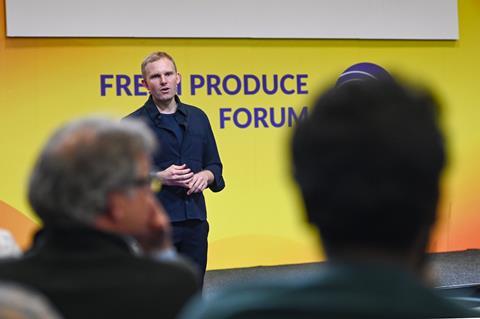This session from day two of the Fresh Produce Forum looked at how the supply chain could be better organised and how food waste could be reduced
The role that technology could play in cutting food waste was the subject of a Fresh Produce Forum session on day two of Fruit Logistica.

Elad Mardix, CEO and co-founder of Clarifruit, and Daniel Khachab, CEO and co-founder at Choco, were on hand to showcase how they could help optimise the efficiency of the supply chain.
Mardix explained how Clarifruit had been the first company to build AI-powered quality control software exclusively for the fresh produce industry.
“Data on the quality of you produce actually exists, in the highest detail, from the farm to the store,” he said. “The issue is that our ability as an industry today to take advantage of this information and derive actionable insight is very limited.”
Ultimately, he said, the aim was to help reduce waste by correcting the quality mismatch the exists in the supply chain – namely, the seller not getting the correct price, and the buyer not getting the required quality.
The way quality control (QC) had been done across the business for many years needed to be updated, Mardix noted, by firstly automating the data collection process with respect to quality, and secondly generating real-time information so you were not relying on the subjective view of a QC director, but rather hard data, when making business decisions.
Mardix demonstrated the Clarifruit app and outlined how an inspector could automate a sample-based QC process from any location.
“Our goal in life is to help standardise the way quality is evaluated across the entire supply chain in order to reduce this quality mismatch and waste,” he added.
“Every player is going to have its own quality spec, because you have to differentiate your brand, but the way you perform the evaluation has to be standardised.”
Greater digitisation
During his presentation, Khachab explained that some 40 per cent of food is lost to waste across the supply chain and at the end consumer, although it could actually be a higher figure.
The reason it was such a complex issue was because no one section of the chain lost the lion’s share of that 40 per cent, he said.
Waste was a hard thing to remove given the sheer volume of challenges faced, including demand prediction, inventory management, cycle time, customer management, shelf-life and a shortage of labour.
This is where digitisation could make a huge difference, he confirmed.
“We know that agriculture is one of the least digital industries out there,” Khachab told those watching. ”And this means there is a massive potential that we can harness by providing automation for this industry.”
His company, Choco, offered three things: Choco AI for digital orders; CRM AI for understanding purchasing behaviour; and Marketing AI for customer research.
The platform had helped eliminate waste for a number of customers through digitisation and automation, he outlined.
“We believe AI is the most important technology of the century,” Khachab added. “It can be complex, and our job is to make it usable for everyone in the supply chain to enable our vision of a sustainable food system.”



